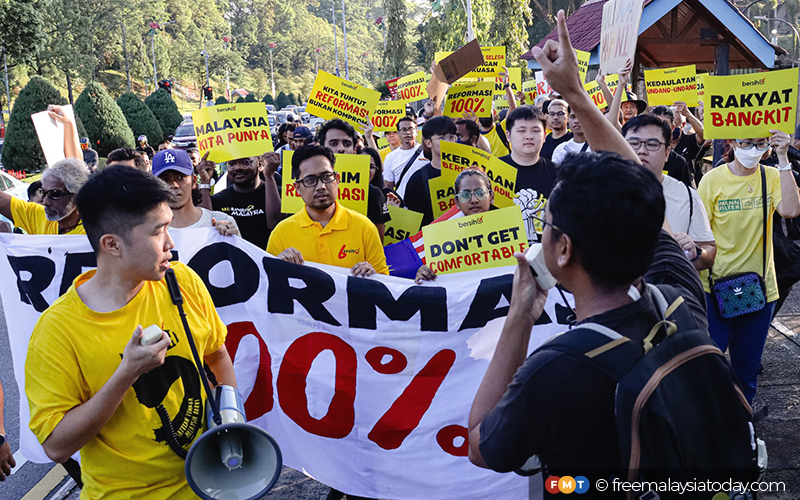Accusations of betrayal and unfulfilled promises of reforms have been flying fast and furious but, behind the scenes, efforts are being pursued to realise the pledges made.

Once a powerful voice that was able to flood downtown Kuala Lumpur with a sea of yellow-shirted people, the rally crowd on Tuesday morning was so sparse it was almost outnumbered by police personnel and media people.
Cynics say it is living proof that Bersih was basically a vehicle used by Pakatan Harapan to overthrow Barisan Nasional and that the NGO has been used and discarded like tissue paper.
But Pakatan politicians are the ones who ought to be embarrassed for what some reporters described as “hiding inside” Parliament instead of facing the protesters.
The tables have turned and it is ironic that Pakatan is now on the defensive.
Only six MPS emerged to meet the protesters among them being Sungai Petani MP Taufiq Johari who said his party, PKR, has not abandoned its reform ideals.
“Don’t dwell on the size of the Bersih crowd. It is the message they carry that is important and we support that,” he said.
Taufiq pointed out that Prime Minister Datuk Seri Anwar Ibrahim also spent about 40 minutes in his Parliament office to listen to the Bersih delegation and also to explain that reforms are still his priority.
A year is quite impossible to implement the sky, the moon and the stars that Pakatan had promised during the election campaign.
Tiktok is flooded with videos of Anwar and also Rafizi Ramli slamming the then government over the ringgit and the economy when they commanded the ceramah stage.
Pakatan had promised to “save Malaysia” but businessmen are staggering under the shrinking ringgit.
The government is under pressure and DAP has been labelled as MCA 2.0 for their silence on issues, including the never-ending saga of the Teoh Beng Hock death which the party had used to inflame Chinese sentiments.
It has been a thorny period as the past returns to haunt Pakatan leaders.
Actually, Pakatan politicians said so many silly things on the ceramah circuit and their supporters have only themselves to blame for swallowing everything without chewing.
“To be fair, the unity government is now dealing with a bit of what each party promised because it took a few months for the new partners to find the chemistry of working together.
“But they have not sat down to talk about a combined manifesto, to tell people that this is what we will do as a coalition government,” said lawyer Ivanpal S. Grewal.
Much credibility also went down the drain over the preferential treatment given to the corruption cases of Umno leaders Datuk Seri Dr Ahmad Zahid Hamidi and Datuk Seri Najib Razak.
Ivanpal said that while the average Malaysian is concerned about the rising cost of living, the noise among the chattering class is on issues like equal allocation for the Opposition, political funding and strengthening the judiciary and the Malaysian Anticorruption Commission.
“None of the Pakatan leaders seem to be thinking about how the unity government wants to be perceived in the eyes of the public and Anwar cuts a lonely figure defending his government’s policy.
“The government is failing on the communication front,” said Ivanpal.
Investors and businessmen, said Ivanpal, expect an economic roadmap by now.
The mantra that reform takes time may sound like a lame excuse but legislative reform is not like cooking Maggi Mee.
Also, it is not that the government is doing nothing about it.
“We are working on it and we want it to be properly done,” said Selayang MP William Leong who chairs the Parliamentary Select Committee on Human Rights, General Elections and Institutional Reform.
The government has tackled the low-hanging fruits like laws on sexual harassment, child protection and amendments to the Suhakam Act.
Leong, who was also there to meet the Bersih protesters, said Bersih then under the chairmanship of Thomas Fann was the first NGO that the select committee met in April last year.
This was followed by discussions with more NGOS like Tindak Malaysia, Suhakam, the Civil Society Organisation, Institute for Democracy and Economic Affairs (Ideas) and groups connected to refugee and prison reform.
“Everyone, especially the NGOS, have their pet reforms but we also have to prioritise. I told the NGOS that we are new cooks who have just come into the kitchen and there are 10 pots boiling away on the stove.
“The devil lies in the details. For instance, separating the Attorney General’s Chambers and Public Prosecution cannot happen overnight. We have to look at the legal side as well as the administrative implementation.
“I understand people are impatient that change is not coming fast enough but even when we buy a house, it takes three years to be completed. Let me say this – the changes we promised are on the way,” said Leong.
Anwar has turned out to be more lively than his immediate predecessor Datuk Seri Ismail Sabri Yaakob. He is also less aloof than Tan Sri Muhyiddin Yassin and certainly younger and more energetic than Tun Dr Mahathir Mohamad.
But he is surely aware that the last time ordinary people complained so much about the ringgit and cost of living issues was when Najib was still in charge and that is not a good parallel.
Truth be told, the non-malays had wholeheartedly supported Anwar because they believed they were voting for a more equal Malaysia. It is a painful realisation that the Chinese tsunami could not deliver the New Malaysia they expected.
But time is on Anwar’s side. He has a supportive King on his side and another three years to work on delivering the change.
The Star by JOCELINE TAN The views expressed here are entirely the writer’s own.







 China Wen:Serve the people well, aim for big accomplishments, not big titles!
China Wen:Serve the people well, aim for big accomplishments, not big titles! 